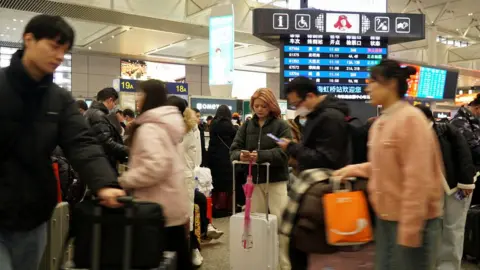By Lok Lee
 Reuters
Reuters"If I had the choice, I definitely wouldn't go back home," says Yuwen, a 33-year-old who has been unemployed for more than six months, days ahead of the Chinese New Year.
Many of China's nearly 380 million internal migrants only go home once a year - and the Lunar New Year, the most important festival for family reunion, is usually the time to do it. That is why the Spring Festival travel rush, known as "chunyun", is the world's largest annual mass migration. Authorities are expecting a record nine billion trips this time for the Year of the Dragon.
But Yuwen dreads the homecoming trip because he says he will be grilled by relatives over every aspect of his life, particularly his work situation including salaries and benefits. His parents know he has lost his job and have been understanding about it. They have agreed with Yuwen that the best course of action is to lie to relatives that he still has his old job.
Yuwen will also spend just three days with his relatives - usually it would be more than a week. "It will be over soon," he says.
Hundreds of young people have taken to popular social media platforms such as Xiaohongshu and Weibo to say that they will not go home for the festival. Like Yuwen, some of them are recently unemployed.
Official data released in June 2023 revealed more than one in five city-dwellers aged between 16 and 24 in China were unemployed. China then suspended the release of youth unemployment data until last month. The figure now stands at 14.9% - but the data excludes students.
After decades of breakneck growth, the Chinese economy is losing steam and the anticipated post-Covid recovery has not materialised. Its real estate market has crashed, and local government debts are mounting.
But the confidence crisis is perhaps the thorniest issue - investors are worried that the Chinese leadership will prioritise party control over economic development. Under China's leader Xi Jinping, there have been crackdowns on private enterprises from tech to private tutoring. Relations with the West have also deteriorated over the last few years.
 Handout
HandoutYuwen is a victim of the clampdowns on private enterprises.
In 2014, he decided to pursue a graduate degree in Chinese language education in Beijing, about 185 miles (300km) away from his hometown in Hebei province. It was to "ride the wave of a national policy" - because Mr Xi had launched the Belt and Road Initiative a year before to spread greater influence overseas.
After he graduated, he quickly found a job at a private tutoring company and was tasked with managing and training foreign tutors for Chinese students. But in July 2021, the Chinese government banned private, for-profit tutoring in the name of easing the burden on students. This was a death knell for the $120bn (£95bn) tutoring industry.
Yuwen was forced to change careers. He got a job at a big tech company in January 2023. He was responsible for formulating live-streaming rules for its overseas platforms and supervising the work of prominent influencers. But it only lasted five months.
A regulatory crackdown on big tech since late 2020 had already wiped off more than $1 trillion in its value, according to Reuters. Then the US threatened sanctions against Chinese tech companies over concerns with Beijing's national security legislation. That proved to be the last straw for Yuwen's company, which decided to move its overseas operations outside China.
Yuwen says he has sent out his CV over 1,000 times in the last six months alone. He has not received any job offers even though he has already lowered his salary expectations. "At the beginning, I felt quite calm but then I became increasingly anxious. I didn't expect it to be this difficult," he says.
 Handout
HandoutIn the southern city of Shenzhen, fitness trainer Qingfeng has decided to go travelling by himself for the Chinese New Year.
He will lie to his parents, telling them he cannot buy the tickets to come home. "Who doesn't want to go home to celebrate the new year? But I just feel embarrassed."
After leaving the military in 2019, Qingfeng started working as a fitness instructor and says he was able to make about 20,000 yuan ($2,800; £2,200) per month in Shanghai. Last year, he moved to Shenzhen to be closer to his girlfriend who is studying in neighbouring Hong Kong.
The 28-year-old found a job with a foreign trading company as he wanted more job stability. But the pay was only 4,500 yuan a month. This was unsustainable as monthly rent in Shenzhen is at least 1,500 yuan.
Qingfeng left his job after two months and has now got a position at a new gym that will open after the holidays. But he does not want to see his family, because he says he lost almost all his savings last year. He does not want to divulge details, but he says: "You can say that I have failed in the stock market."
In early February, Chinese stocks plunged into a five-year low. The Weibo account of the US embassy became an outlet for the frustrations of Chinese investors, with some even calling on the Americans to help. Some criticised the current leadership. All such posts have since been taken down.
 EPA
EPAQingfeng is not sure he will be able to build a customer base at the new gym due to the economic downturn. "Many large gyms have shut down lately because of their high debts."
But is is not just the economy that has prevented some young Chinese from wanting to go home for the festival.
Some single women - like Xiaoba - say they do not want to be pressurised by their families to get married and settle down.
"I have been working across the country. Whenever I go to a city, my mother will find a man out of the blue and tell me to go on a blind date. It's outrageous," says the 35-year-old project manager.
Its low birth rate has caused fears that the country will lose young workers, who are a key force in propelling its economy. Young people are increasingly reluctant to get married and have children, and the number of registered marriages has been declining for nine consecutive years, according to official data.
In October, Mr Xi said women played a "unique role" in promoting traditional virtues and there was a need to cultivate a "new marriage and childbearing culture" to tackle the ageing population. But the government's efforts to boost marriage and birth rate so far have been ineffective.
Xiaoba no longer panics about getting married and is enjoying her life. She is planning to spend the Lunar New Year with her cat and watch the huge CCTV New Year's Gala - which is aired every Spring Festival Eve - at her rented flat in Shenzhen.
Yuwen, for his part, hopes that the next Lunar New Year will be better. "I believe I will make it because I am determined. I have never considered giving up."
But there are things out of his control. "I am not too optimistic about the economy in 2024."
Interviewees have been given pseudonyms.
Bad economy, nosy relatives: Young Chinese put off by Lunar New Year - BBC.com
Read More
No comments:
Post a Comment